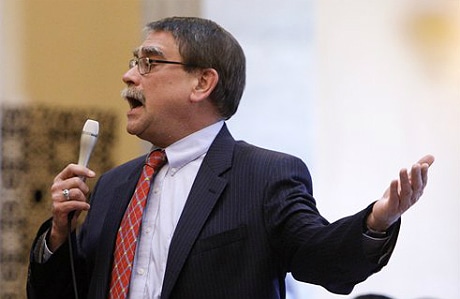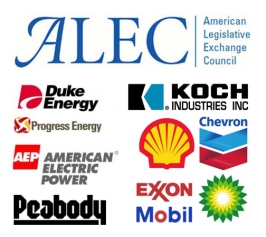Crossposted from Greenpeace’s blog: The Witness.
Ohio is currently fighting this year’s final battle in a nationally-coordinated attack on clean energy standard laws, implemented by the American Legislative Exchange Council (ALEC) and other groups belonging to the secretive corporate front group umbrella known as the State Policy Network (SPN).
ALEC and SPN members like the Heartland Institute and Beacon Hill Institute failed in almost all of their coordinated attempts to roll back renewable portfolio standards (RPS) in over a dozen states–laws that require utilities to use more clean energy over time. After high profile battles in North Carolina and Kansas, and more subtle efforts in states like Missouri and Connecticut, Ohio remains the last state in ALEC‘s sites in 2013.
ALEC Playbook Guides the Attack on Ohio Clean Energy

ALEC‘s newly-forged Renewable Energy Credit Act allows for RPS targets to be met through out-of-state renewable energy credits (RECs) rather than developing new clean energy projects within Ohio’s borders. RECs have varying definitions of renewable energy depending on the region they originate from, lowering demand for the best, cleanest sources of power and electricity.
Sen. Bill Seitz’s SB 58 takes advantages of existing provisions of Ohio’s RPS law and tweaks other sections to mirror the key aspects of ALEC‘s Renewable Energy Credit Act. His RPS sneak-attack is matched by House Bill 302, introduced by ALEC member Rep. Peter Stautberg.
Just five years ago, Senator Seitz voted for Ohio’s RPS law. Now, Seitz calls clean energy incentives “Stalinist.”
Attacks on Ohio’s Clean Energy Economy: Fueled by Dirty Energy Profits
Most of ALEC‘s money comes from corporations and rich people like the Koch brothers, with a tiny sliver more from its negligible legislator membership dues ($50/year). This includes oil & gas giants like ExxonMobil ($344,000, 2007-2012) and Big Oil’s top lobbying group, the American Petroleum Institute ($88,000, 2008-2010). Exxon and API just two of dozens of dirty energy interests paying to be in the room during ALEC‘s exclusive Energy, Environment and Agriculture task force meetings.
Other polluting companies bankrolling ALEC‘s environmental rollbacks include Ohio operating utilities like Duke Energy and American Electric Power. AEP currently chairs ALEC‘s Energy, Environment and Agriculture task force. Some of these companies (like Duke Energy and the American Petroleum Institute) pay into a slush fund run by ALEC that allows Ohio legislators and their families to fly to ALEC events using undisclosed corporate cash (see ALEC in Ohio, p. 6).
Ohio Senator Kris Jordan used corporate money funneled through ALEC to attend ALEC events with his wife (ALEC in Ohio, p. 7). With electric utilities as his top political donors, Sen. Jordan has dutifully introduced ALEC bills to repeal renewable energy incentives (SB 34), along with other ALEC priorities like redirecting public funds for private schools (SB 88, 2011), and blocking Ohio from contracting unionized companies (SB 89, 2011).
Koch-funded Spokes & Junk Data Bolsters the ALEC Attack

Rather than listening to these voices from Ohio, Senator Seitz has sided with out-of-state Koch-funded mouthpieces invited to testify against the Ohio RPS. Back in March, Seitz heard anti-RPS testimony from The Heartland Institute’s James Taylor, who repeated false claims that the RPS will make electricity unaffordable.
Taylor’s assertions mimicked those made in a debunked series of reports written for ALEC‘s RPS attacks. The Ohio anti-RPS report was co-published by the Koch-funded Beacon Hill Institute and the American Tradition Institute (ATI), sister group to the Koch-funded Competitive Enterprise Institute. ATI, now known as the Energy & Environment Legal Institute, was largely funded by Montana petroleum millionaire Doug Lair.
Senator Seitz also heard testimony from Daniel Simmons of the Institute for Energy Research (IER), who recited long-debunked statistics from the so-called “Spanish study” and “Danish study.” Koch-funded groups have used these two papers for years to stifle clean energy growth in the United States. Daniel Simmons previously worked for ALEC and the Mercatus Center, which was founded by the Kochs. Heartland and the Institute for Energy Research have financial or personnel ties to the Kansas billionaire Koch brothers.
RPS and Energy Efficiency Are Helping Build Ohio’s Economy
Thanks in part to energy efficiency incentives and the RPS law, Ohio’s clean energy economy is expanding rapidly, with 25,000 Ohioans employed by 400 companies in the sector. Wind energy is set to expand rapidly, with the American Wind Energy Association projecting $10 billion in investments over the next decade, thanks to the RPS targeted by ALEC and its dirty companies through loyal politicians like Senator Seitz.
Not content to just weaken incentives for clean energy growth, Bill Seitz’s SB 58 would also undermine energy efficiency standards, another item on ALEC‘s agenda. This despite a projected $2.7 billion in savings for Ohio by 2012, as directed by the efficiency and RPS laws.
No wonder ALEC got dumped by its wind and solar trade members.
—-
*Since 2007, Senator Seitz has received $46,450 from coal utilities that are ALEC member companies:
- $21,500 from American Electric Power (AEP)
-
$15,300 from Duke Energy
- $4,800 of this bundled from Duke Employees in Ohio, Kentucky and Indiana during the 2008 election cycle
- $4,000 from NiSource
- $3,000 from Dominion
- $2,650 from the Ohio Rural Electric Cooperatives, a member of the nation’s top dirty energy lobbying heavyweight, the National Rural Electric Cooperative Association.
If you add contributions from FirstEnergy, AES subsidiary Dayton Power & Light, and the Ohio Coal Association, Sen. Seitz’s coal money since 2007 tops $66,000.
ALEC‘s December, 2012 meeting in Washington, DC was heavily sponsored by coal companies, including AEP, the National Rural Electric Cooperative Association (NRECA), and Edison Electric Institute, the utility trade group whose membership includes Duke Energy, AEP, NiSource, Dominion, AES and FirstEnergy.
Data aggregated by the National Institute for Money in State Politics – FollowTheMoney.org
Subscribe to our newsletter
Stay up to date with DeSmog news and alerts









